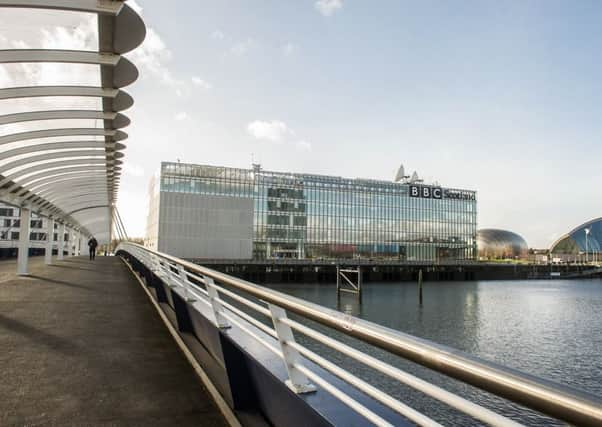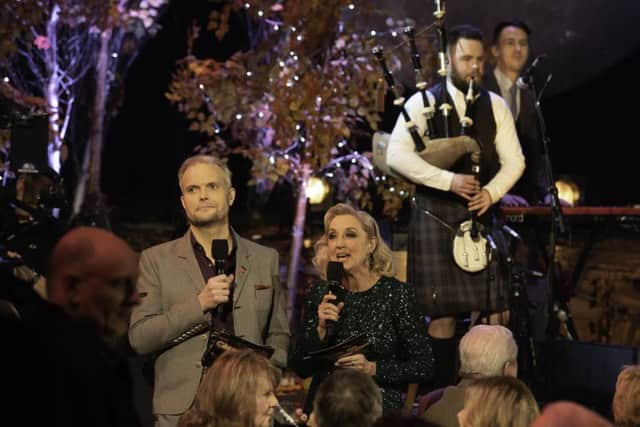Alistair Heather: New TV channel is something to sing about


As STV and others cut journalist numbers, the BBC is expanding its previously totie wee base of staff north of Hadrian’s into something substantial.
When the BBC in Scotland gets it right, it can be superb, like an excellent two-parter by Billy Kay on BBC Radio Scotland. Sangsters was a look at the lively contemporary Scots song scene in Scotland.
Advertisement
Hide AdJohn Morran, an Ayrshire singer, was a great interview. He introduced the mining songs of Muirkirk, a soot-black village in the southwest. Growing up in the rural east coast, the whole coal-belt was naively assumed to be one big Methil, a cultural desert from Fife to Ayrshire. Kay’s programme proved this idea an empty prejudice. Muirkirk has just as vibrant a cultural legacy as any Angus toun. That is what an effective national broadcaster can achieve – clearing the fog of ignorance, building understanding between distant communities.


Kay presented the programme in the Scots language, and the majority of his interviewees respond in kind, a touch that seemed to put people at ease and draw out fascinating stories on their relationship to the language. Scots is often portrayed as being so dialect-alised that one group can barely understand another. Yet Kay holds conversations using his Ayrshire dialect with singers in Angus, Buckie and Huntly. Scots is shown as a medium fit for national discussion.
Those that don’t hear Scots in their everyday lives, or are unaware of the various deep veins of our cultural heritage absolutely should be able to encounter them on their national broadcaster. We must acknowledge that the service to date has often not withstood comparison with some of our European neighbours. In Finland, the state-funded broadcaster controls four TV channels, 13 radio channels and 25 regional radio stations.
The new BBC channel offers a great chance to improve its reportage and insight into the nation. We need not necessarily look overseas for examples of making a massive cultural impact on a relatively small budget. BBC Alba has, since its founding a decade or so ago, provided a great platform for Scots musicians and athletes to shine.
The BBC Alba Hogmanay programme, Cèilidh na Bliadhn’ Ùire, exemplified so much of what is impressive and enjoyable about the programming. Warm, cheery hosts linked between a series of great musical performances from a range of talents.
From the very young pupils of a Gaelic primary school through the range of working musicians in the Gaelic tradition, from pipers to choirs and young energetic six-piece hò-rò, just about everyone was represented.
Advertisement
Hide AdAlba has become a recognised benefactor and curator of modern Scottish culture.
The new channel could be a vital injection of life into wider Scottish culture. It offers an increased chance for Scottish issues to be aired at a national level. It will bring through and develop hundreds of new talents, many of whom will spin off and create their own unique work.
Advertisement
Hide AdIt will be like a whale swimming in Scottish waters. Whole ecosystems will flourish around it, from algae to pilot fish to giant squid. New podcasts, blogs, and multimedia content will be soon pouring out of the BBC.
Some critics claim a single channel that only broadcasts part of the time won’t make much impact. It has also been noted that the budget – £32 million annually – is a fraction of the main Irish channel RTE1’s £100m.
The BBC in Scotland also has the issue of trust to deal with. Many supporters of independence see the BBC as a mouthpiece for government propaganda. Others accuse it of reporting only the bad news. At times it can feel that Brechin, Kirriemuir and Forres only turn up on the BBC when there’s a fitba match or a brutal murder.
I would argue this new investment is on the whole welcome. Whilst some criticisms are relevant, many of BBC Scotland’s troubles can be solved, or at least addressed, by increasing the capacity to cover stories and represent viewpoints across the nation.